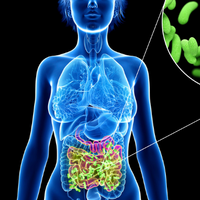What is Leaky Gut Syndrome?
Your gastrointestinal system includes the small and large intestines, which carry out the final stages of digestion. A healthy intestinal lining is naturally protected by mucus and other secretions for proper lubrication. During the digestive process, nutrients and water readily flow between the intestines and bloodstream. However, damaged intestines will allow toxic chemicals, bacteria and other harmful substances to enter the blood. A leaky gut essentially refers to an excessively permeable condition of intestinal linings. When foreign substances enter the veins and arteries at high rates, you feel certainly feel sick.
Symptoms of a Leaky Gut
A leak in the gut has been known to cause various types of autoimmune reactions inside the body. When too many foreign substances and live bacteria invade the bloodstream, your body will naturally produce antibodies to fight off the invasion. The production of antibodies ultimately leads to autoimmune cycles throughout different parts of the body. For example, you might develop arthritis and other pain in different joints from head to toe. The continuous inflammation in the intestines and joints could also lead to fatigue as your body naturally fights itself. You might also feel tired because essential nutrients don't get properly absorbed by the intestines.
A leaky could cause a wide range of gastrointestinal complications, including bloating, diarrhea and constipation. An imbalance in the gut microbiota might be caused by insufficient or excessive water. As fluids leak from the gut in excessive amounts, the digestive process is severely disrupted. Diarrhea is typically caused by improper absorption of water in the lower gastrointestinal tract. Similarly, a leaky gut could cause constipation because too much water leaves the gut. The partially digested food particles become rigid in the intestines. A leaky gut could also facilitate the production of toxic gases and other products from bacteria and enzymes inside the digestive tract. The gaseous byproducts ultimately lead to bloating and flatulence.
Treatments For a Leaky Gut
You could manage a leaky gut by changing dietary habits and other making other lifestyle adjustments. Gluten, soy and dairy products might irritate the intestinal linings. You should get tested for celiac's disease or Crohn's disease to confirm any intolerance to such common items. If you reduce or eliminate such ingredients from your diet, you might mitigate some of the leaks inside your gut. By eliminating some antibiotics and other synthetic compounds from your diet, you might speed up the recovery from a leaky gut. Certain prescription medications could cause a thinning of the intestinal linings and other lubricated membranes inside the body.
Probiotics are also known to improve the gut microbiota in natural ways. Such beneficial bacteria may support the digestive process in the upper and lower intestines. You should select an appropriate strain of probiotics for optimum effects on a leaky gut. Prebiotics can also support digestion in the lower tracts of your gastrointestinal system. A diet that's rich in fiber naturally contains lots of helpful prebiotics. The gut microbiota requires a proper balance of prebiotics and probiotics to neutralize any harmful bacteria. Additionally, regular exercise could stimulate some phases of the digestive process inside the stomach and gut.








0 comments